
“An ounce of prevention is worth a pound of cure (Benjamin Franklin)”
Believing that the body was wonderfully and fearfully made, we have updated our immune stimulating protocols (attached) originally written-up by Dr. Ana Casas, a consultant and advisor to our Company, to fight infectious diseases including COVID-19 and it’s variants. Dr. Casas is Board Certified in Anti-Aging and Regenerative Medicine with residency training in Internal Medicine. Ana is traditionally trained with specialty training in preventative, longevity, anti-aging and regenerative medicine. She was selected as one of the “leading physicians of the world” by the International Association of Internists (IAI).
Each year 10 million people worldwide develop tuberculosis and 1.6 million die, making it the most common lethal infection. Infectious disease kills 17 million people each year; 30 new infectious diseases have emerged in the last 20 years. Many of these diseases have no treatment, cure or vaccine. 385 million people have Chronic Obstructive Pulmonary Disease (COPD), 3 million die annually making it the third leading cause of death worldwide.
The World Health Organization (WHO) reports that 91% of the world’s population live in places where air quality exceeds WHO guideline limits. Infectious diseases like COVID-19 have been with us, are here to stay and our best offense is a good defense like diet, fresh air, sunlight and nutraceuticals.
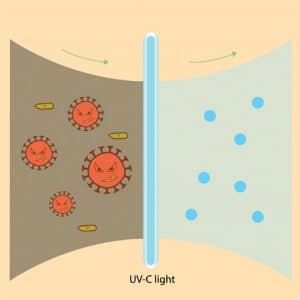
We have proven with our Communities that developing buildings with UV lighting in many of the common HVAC systems (can kill the Ebola virus), negative ion emission (lifts moods and kills viruses and bacteria), full building water filtration systems; all make a difference. The attached revised protocol is our third step of several to come to protect you and your loved ones from something which is; frankly part of a viral family that has been a part of the earth’s microbiome for thousands of years.
With Blessings we offer this to you and your loved ones as a phased plan to minimize, if not eliminate, the harmful effects of COVID-19 or any virus in our buildings.
We have many other protocols coming which are part of our “New Awakening with Common Sense”. GodSpeed, Live in no Fear and Cheers!
Al Holbrook MPH
Chairman
Dogwood Forest Optimal Immune System Protocol
Coronaviruses, and especially COVID-19, have become a household word. It is important to have a protocol that optimizes the immune system to reduce the risk of spread of this and all viruses. A virus is not a living thing. It is a code contained in an envelope that has to attach to a cell in order to live and spread. The COVID-19 specifically attaches to the ACE2 receptor cells in the nose, throat, lungs and other organs throughout the body. There is a lot that you can do to make your immune system stronger so that if COVID19 or another virus enters your body, you can win the war against the viral invader.
Symptoms and Clinical Presentations:
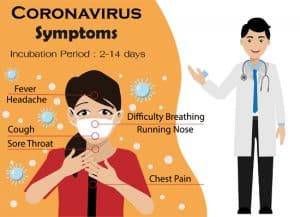
COVID-19 SYMPTOMS:
The Centers for Disease Control and Prevention currently lists them as:
- Fever
- Cough
- Shortness of breath or difficulty breathing
- Chills
- Repeated shaking with chills
- Muscle pain
- Headache
- Sore throat
- New loss of taste or smell
Some people may display no symptoms (asymptomatic) yet still be capable of infecting others.
The most common way that COVID-19 presents is with fever and dry cough accompanied by flu-like symptoms.
There are other symptoms that have specifically been observed with COVID-19:
Eye symptoms:
There are reports that some people may experience eye symptoms early on such as conjunctivitis (pink eye) and eye discharge.
Gastrointestinal symptoms:
Some people may experience gastrointestinal symptoms such as loss of appetite or diarrhea in addition to respiratory symptoms or in place of it.
Loss of Sense of smell and taste:
Another symptom includes loss of sense of smell and taste in people with COVID-19. This can also occur with other viral respiratory diseases such as the common cold or influenza, but this is much more common in COVID-19 since it affects the olfactory nerve.
Blood Clotting:
People with severe COVID-19 have a significant increase in developing blood clots and vascular problems throughout the body. The virus causes excessive clotting in the tiny capillaries in the lungs where gas exchange takes place, and this makes it hard for the lungs to deliver oxygen to the blood.
Ischemic Strokes:
In younger people with COVID-19 who do not have traditional stroke risk factors,this increase in blood clotting causes an increased incidence of ischemic strokes. Anticoagulation therapy has become a standard of care for treatment.
Rashes and Chilblains:
Rashes, plaque-like lesions, and painful red or purple lesions on the fingers or toes,called chilblains, are skin manifestations being seen in COVID-19. They may represent inflammatory effects of the SARS-CoV-2 virus, or they may be due to coagulation and clotting problems that damage the delicate blood vessels supplying the skin. Both factors may cause this wide variety of skin manifestations being reported in COVID-19 patients.
Older people and people who have pre-existing conditions such as obesity, cancer, autoimmune diseases, Type 2 Diabetes or hypertension, have an increased risk forgetting COVID-19. They can have a fast progression to acute respiratory distress syndrome (ARDS) and death.
Routes of Transmission:
There are four possible routes of transmission of COVID-19:
respiratory droplet, contact, aerosol, and oral-fecal.

Respiratory droplet:
Respiratory droplets are believed to be one of the most important routes of transmitting COVID-19. The virus is found in droplets released from the respiratory tract of an infected individual through a sneeze or cough. When these droplets are inhaled by a person who is close to the infected person then the virus is transmitted. Because respiratory droplets play such an important role in spreading of the virus, it is crucial that a mask and refer ably an N-95 mask be used and social distancing of 6 or more feet between individuals be used whenever possible.
Respiratory droplets may land on or near another person, be picked on the hands,and transferred to the respiratory tract through touching the nose, mouth, or eyes. A mask also helps to remind an individual not to touch their face. The CDC stated in mid-May 2020 that infection via contaminated surfaces is not likely to be a major route of transmission for the virus but it should still be addressed since it is possible if the respiratory droplets are still present.
Contact:
Direct person-to-person contact is another way that the virus can spread. In this situation, the virus is transferred when a person who does not have the virus comes into contact with an infected person who is actively shedding virus. This is the reason that staying at least 6 feet apart is so important.
Aerosol:
The aerosol route of transmission involves breathing in viral particles that are in the air. These can be at a distance from the infected person. Aerosol transmission appears to be an especially important concern in healthcare settings. SARS-CoV-2 aerosols are detectable for up to three hours in the air. Transmission of viral particles can increase by a cough, speaking and even breathing.
Oral-fecal:
The oral-fecal route is another way the virus can be spread through the feces. The virus can be found in feces. This is more common in people with diarrhea who are shedding the virus. Surfaces can become contaminated and then by touching those surfaces the virus can be brought to the face and into the respiratory tract. This is an uncommon but well documented route of transmission for coronaviruses such as the SARS virus. It is very important to address this route in order to contain transmission of the virus.
Protective Measures:
Below are some basic measures to consider in order to reduce your risk of contracting COVID-19 and other viral illnesses.
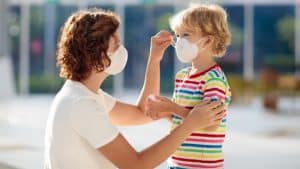
Face Masks:
Cloth masks, surgical masks and N95 (to N99) respirator masks are the three available mask choices. Of the three choices, the N95 (to N99) respirator mask has the highest chance of preventing the transmission of the virus. The recommendation for widespread cloth face mask use is to help reduce the spread of COVID-19 in the community. Cloth face masks reduce the amount of virus than can be spread from an infected person to an uninfected person, but they offer very limited protection against infection with SARS-CoV-2. Cloth mask should not be used as a substitute for social distancing. Cloth masks help prevent the spread of infection by lowering the spread of respiratory droplets into the environment by someone who is infected with the virus.This is very important because many people infected with SARS-CoV-2 show any or just mild symptoms and may not realize they have it.
An N95 mask has a filtering ability down to, and actually below, the size of SARSCoV- 2, the virus that causes COVID-19. So, the coronavirus is about 0.12 microns in diameter and N95 masks protect transmission of this size particle for up to 95%of the time. An N99 masks protect transmission of this size particle for up to 99%of the time. Cloth face masks made of high-quality, high-thread-count woven cotton are being recommended for the public, but they do not offer the same protection as an N95(to N99) mask. The N95 (to N99) masks are being reserved for healthcare workers who are at highest risk of receiving and transmitting the virus due to longer hours of exposure to the virus and higher risk of exposure due to their work environment.
Social distancing:
The most effective strategy to protect yourself from COVID-19 is to avoid coming into contact with a person who has the virus. Since the virus is found through out the world and is so widespread, you should assume the people you come in contact with may be infected and stay at least six feet away from them. A person can be infected and shed the virus for several days before they have symptoms and in asymptomatic carriers of the virus, they may never experience symptoms at all.
The Centers for Disease Control and Prevention (CDC) and other health authorities worldwide strongly advise that people who are at increased risk for getting the virus and who live in communities experiencing community spread of COVID-19,that they avoid situations where groups of 10 or more people gather and maintain at least 6 feet of distance from others when possible.
Avoid non-essential travel:
Avoiding travel to areas with known community spread is recommended. All air travel should be avoided as it is associated with exposure to people and the infectious diseases they carry. It is well documented that traveling on commercial airlines increases the risk of transmission of viruses and other infectious diseases.
Outbreaks measles, influenza, SARS, COVID-19 and many other infectious diseases aboard commercial flights have been documented. Transmission of COVID-19 on mass public transportation such as a bus, have also been documented.
Therefore, avoiding air travel or any mass transportation system is a reasonable precaution for reducing your risk of viral infections and especially if you are at high risk.
Wash your hands:
COVID- 19 is a virus which is not alive so it basically a code in an envelope that breaks down when exposed to soap and water. It destroys it. Frequent hand washing is an important strategy for protecting against all types of infectious diseases and especially viruses. Disinfectants and hand sanitizers that contain at least 70%alcohol can inactivate the virus on contact and have been shown to be effective in reducing the spread of the virus.
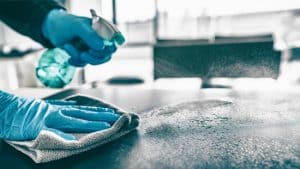
Disinfect surfaces:
It is very important to disinfect high touch surfaces such as doorknobs, telephones,countertops, keyboards, etc., SARS-CoV-2 aerosols have been detected for up to three hours in the air. The virus was also found on cardboard for up to 24 hours and for up to three days on plastic and stainless steel. Transmission by contact from these surfaces is less likely but still a possibility.
Coronaviruses are not alive, and they are basically a code that can be inactivated with proper cleaning and disinfecting agents. Therefore, keeping surfaces clean and properly disinfected is important to limit the spread of infectious diseases caused by coronaviruses. Regarding which disinfectants are best for inactivating the virus, the United States Environmental Protection Agency (EPA) provides a list of EPA-registered disinfectant products for use against the SARS-CoV-2 (COVID-19) virus. The list is available on the EPA’s web page: https://www.epa.gov/pesticide-registration/list-n-disinfectants-use-against-sars-cov-2
Strengthen immunity:
Optimal functioning of the immune system is vital for defending against all type sof infections, from mild colds to the seasonal flu all types of pneumonia. A nutrient-dense diet, regular exercise, adequate sleep, and stress management can all contribute to healthy immune function.
Optimal Nutrition:
Optimal nutrition through the food, drink and supplements that you take is important for a well-functioning immune system to protect against viral infections.
Melatonin:
The over the counter hormone, melatonin, is the most important antioxidant that the body makes. As we get older, the melatonin level decreases. It is a very important anti-inflammatory hormone and a regulator of the immune system. There is evidence that melatonin may reduce the severity of the disease. Melatonin is effective in patients who are critically ill by acting as an anti-inflammatory,reducing anxiety and improving sedation and sleep quality, which might also be beneficial for better clinical outcomes for COVID-19 patients. There is significant data showing that melatonin limits virus-related diseases and would also likely be beneficial in COVID-19 patients.
Melatonin has a high safety profile. The recommended dose of melatonin is between 0.5 mg- 3 mg orally nightly at bedtime. Once it has been taken, it is important to avoid looking at any type oflight source that would decrease the melatonin level.
Vitamin D:
Vitamin D is an important hormone that helps to regulate the immune system. It is so important that it is the only hormone that our skin can make through exposure to the sun. Many people have a low Vitamin D level that increases their risk of getting a viral illness or many other types of diseases. People with the lowest Vitamin D levels (levels less than 15 ng/mL) were 2.6 times more likely to develop pneumonia compared with those with the highest vitamin D levels in a study that followed older people for nearly 10 years.
Vitamin D deficiency may increase the risk of death in hospitalized patients with community-acquired pneumonia. Medical research shows a clear correlation between a low Vitamin D level and a higher risk of dying from COVID-19. Vitamin D has the ability to increase antimicrobial immune activity. Also, vitamin D deficiency is associated with fewer immune cells in the blood, increasing susceptibility to infection.
Vitamin D is also an immune modulator, involved in stimulating innate immune activity and regulating tissue-damaging inflammation. Vitamin D level can be checked with a blood test called 25 Hydroxy Vitamin D level and the level should be between 50-80 ng/mL for it to be optimal. Vitamin D is stored in the liver and can be toxic if the level is greater than 100 ng/mL so proper lab monitoring is important when taking this as a supplement.
Vitamin D absorption can be increased by taking it at the same time as Omega 3 fish oil or any other type of oil.
Vitamin C:
Vitamin C is an antioxidant and anti-inflammatory which plays an important role in having an optimal immune system. Vitamin C may help treat COVID-19 patients, but it is being studied in intravenous form and not as an oral dose. There is no evidence that taking vitamin C will help prevent infection with the corona virus that causes COVID-19 but it can be taken as a supplement to optimize the immune system function. The recommended dose of Vitamin C for optimizing the immune system is 500 to 1000 mg orally daily.
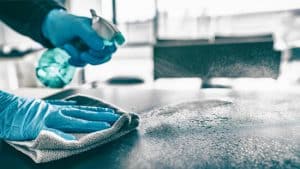
Elderberry (Sambucol®):
Elderberry has a potent direct antiviral effect against the flu virus. It is believed to be beneficial for the prevention and treatment of influenza and upper respiratory infections. It inhibits the early stages of an infection by blocking key viral proteins responsible for both the viral attachment and entry into the host cells. Even though elderberry was shown to have inhibit all stages of flu virus infection,it had a significantly stronger effect on the late stage of infection than at early stage.
Elderberry has been shown to be effective against 10 strains of influenza virus and its effectiveness compares favorably to the known anti-influenza activities of oseltamivir (Tamiflu) and amantadine.
The recommended form of Elderberry is Sambucol® which was used in the flu virus clinical trials. Elderberry has not been studied in COVID-19 patients, but it has been found to be beneficial in the treatment and prevention of the seasonal flu virus and in optimizing the immune system. The dose For Daily Maintenance of the Immune System:
Adults and Children over 4 Years: 2 teaspoons (10ml) daily
For Intensive Use
Adults and Children over 4 Years: 2 teaspoons (10ml) 4 times daily
Lactoferrin and Colostrum:
Lactoferrin is a glycoprotein found in colostrum which is the first milk produced by human and cow milk. It plays an important role in the immune system function. Lactoferrin boosts the immune system through its antibacterial, antiviral, and anti fungal properties. It acts as an antiviral by activating the antiviral cytokines interferon (IFN)-α/β and boosting natural killer (NK) cell activity and Th1 cytokine responses. There are studies that show that lactoferrin may lower the incidence and severity of common respiratory tract viral infections, like colds and flu. During the SARS epidemic that emerged in 2003, researchers reported in 2005 that the gene encoding lactoferrin was highly upregulated in patients that had the virus which they concluded that it plays a role in the innate immune response to the infection. A follow-up study suggested that lactoferrin interfered with the ability ofthe 2003 SARS virus from interrupting the functional and structural integrity of host cells.
Lactoferrin (apolactoferrin) dose: 250 mg to 300 mg daily.
Zinc:
Zinc plays an important role in the immune system. Zinc is necessary for immune cell development and communication and plays an important role in lowering inflammation. Nursing home residents with lower zinc status had almost twice the risk of pneumonia as those with normal zinc status in a yearlong medical study. Low levels of zinc can lower the immune system function, increase the length of time and incidence of pneumonia and prolong recovery from bacterial and viral illnesses. In the elderly, low zinc levels are associated with an increased rate of death from all causes. Zinc is necessary for normal cell division and development as, so it is really important for the immune cells to be able to divide and multiply properly. Zinc supplements may lower the length of time and the severity of upper respiratory tract infections. Zinc also plays a role in prevention of upper respiratory infections. A randomized controlled clinical trial in adults aged 55–87 found daily supplementation with 45 mg zinc gluconate for 12 months was associated with lower incidence of infections compared with placebo. Covid-19 causes bilateral pneumonia. Because pneumonia can be a complication of an upper respiratory tract infection preventing colds or reducing their severity may help protect against pneumonia and the severity of infection from a viral illness like Covid-19.
Recommended dose: Opti-zinc® Zinc monomethionine 30 mg daily Opti-Zinc® also has an added dose of copper 300 mcg per daily dose which can become depleted when taking zinc long term.
Selenium:
Selenium has important antioxidant, anti-inflammatory, and antiviral activities in the body, and deficiency is associated with increased risk of viral infection. There have been links between selenium levels in the body and cure or death rates of those with the COVID-19 virus. The more optimal the selenium level in the patient, the higher the cure rate from Covid-19.
Recommended dose:
200 mcg daily of selenium (as selenomethionine)
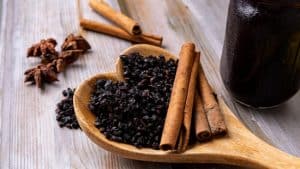
Probiotics:
Probiotics are good bacteria like Bifidobacterium and Lactobacillus species which help to optimize the immune response. They have been shown to possibly reduce the number, duration and severity of viral respiratory tract infections such as influenza. They have not been studied in the treatment of COVID-19, but they are believed to improve immune system function. One randomized controlled trial with over 700 healthy volunteers showed a preparation containing probiotics (Lactobacillus plantarum, Lactobacillus rhamnosus,and Bifidobacterium lactis), lactoferrin, and prebiotics (non-digestible fibers that can serve as a food source for beneficial gut bacteria) lowered the incidence of respiratory diseases during the cold season. Combining probiotics with lactoferrin and prebiotics was shown to decrease the number, severity, and duration of upper respiratory infections and an added benefit was that there was an improvement in bowel function. The same probiotic blend, given with colostrum, the first milk produced by the cow, lowered the incidence of flu compared with vaccination and with no treatment. Bacillus subtilis CU1 is another probiotic that enhanced the immune response and reduced the frequency of respiratory infections in elderly research participants.
Recommended dose:
Garden of Life Dr. Formulated Probiotics Platinum Series Immune+ with 90 Billion CFU Guaranteed. One daily.
Peptides:
Thymosin Alpha 1:
Thymosin Alpha 1 is a peptide, consisting of amino acids, that significantly reduced mortality of severe COVID-19 patients. It tripled survival in ICU patients that received it. Journal of Clinical Infectious Disease Published online May 22, 2020 ahead of print publication. Thymosin Alpha 1 (Tα1) Reduces the Mortality of Severe COVID-19 by Restoration of Lymphocytopenia and Reversion of Exhausted T Cells Lymphocytopenia and T cell exhaustion is notable in acute COVID19 patients, especially in aged and severe cases. Thymosin alpha 1 (Tα1) had been used in the treatment of viral infections as an immune response modifier for many years. Thymosin Alpha 1 significantly reduce mortality of severe COVID-19 patients.
Recommended dose:
Thymosin Alpha 1 is by prescription and the dose depends on the severity of disease.
Exercise:
There is abundant evidence that participating in regular physical activity optimizes the immune system. Exercise is believed to have these effects by activating immune cells, reducing stress and improving overall health.
Any form of daily exercise for 20-30 minutes, in which heart rate increases and sweat is produced, is beneficial for the immune system function.
Note: This information should not be used to replace advice from your doctor or healthcare provider. Every person is an “individual with a unique DNA footprint or metabolism that may not fit the protocols in this summary communication from outside sources. Never delay seeking medical advice because you have read the recommendations in this protocol. You should always investigate on your own and seek medical advice if you decide to change your medical regime or treatment plan. Note, many nutraceuticals can have adverse effects on the effectiveness of pharmaceuticals and/or adverse contraindications. Do not take any over the counter supplements with any pharmaceutical without the express consent of your physician. The information herein is identified to the specific organization which provided such information and should be investigated before any use.
